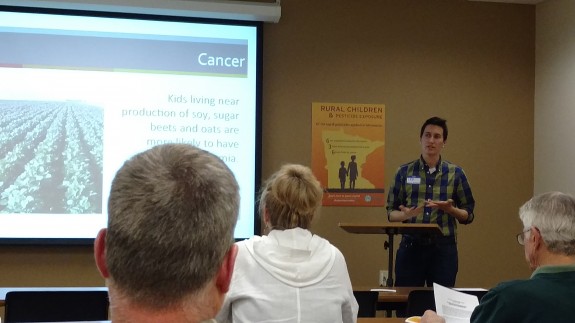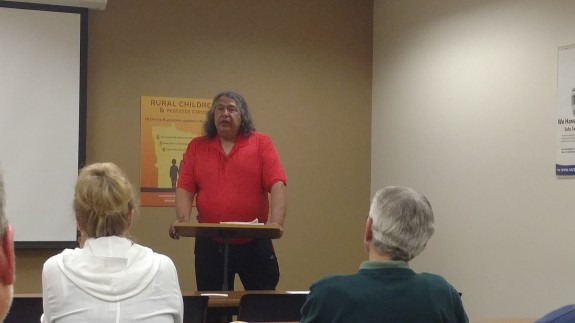
On May 9th the Pesticide Action Network (PAN), an international network working to replace pesticide use with ecologically sound and socially just alternatives, released a report titled “Kids on the Frontline.” The report, which assesses dozens of independent studies, links pesticide exposure to health impacts such as leukemia, brain cancer, and developmental disorders in both children and adults. While most people are exposed to pesticides in various ways, people living in rural areas are on the frontlines for increased exposure and resulting health impacts. This study focuses on small exposures to pesticides over an extended period.
“Direct exposure to drifting pesticides is not the only way children are exposed near application sites. Children can also take in pesticide residues that settle on playgrounds, on lawns or in homes—sometimes days or even weeks after the chemicals were used in nearby fields.
Scientists recently reviewed 35 studies published between 1995–2013, that examined pesticides in household dust in agricultural areas. Overall, the studies found that pesticides drifting from fields are a significant source of dust contamination. In one Iowa study, dust samples in 25 farm and 25 non-farm homes were compared; levels were higher in farm homes for all pesticides measured.”
None of this comes as a shock to advocates for the environment and agricultural reform; but for many, this is news. The report reaffirms the importance of making the public aware of research that could affect daily life.

PAN hosted an event promoting the report with local campaign Toxic Taters in Park Rapids. Apart from the catchy campaign name, Toxic Taters works to reduce pesticide used in conventional potato production. A typical potato, according to the Environmental Working Group’s Dirty Dozen 2016 has, “more pesticides by weight than any other produce.” Among those speaking at the event was self proclaimed ‘pesticide warrior’ and Executive Director of the White Earth Land Recovery Project, Robert Shimek, PAN Organizer Lex Horan, and the Toxic Taters Campaign Coordinator, Amy Mondloch.
Northwest Minnesota and North Dakota are home to RDO, the largest potato producer in the world, and owner of many of the potato fields around Park Rapids. Toxic Taters has opposed immense expansions in irrigation wells over the past two years by the same company. Residents and neighbors have told personal stories of illness and livestock death correlating chemical application on potato fields. Others who have done their own testing have told of high concentration of pesticides on buildings and even in school ventilation systems.
CURE became interested in PAN through our aligned work on protecting pollinator populations and habitat. Increasingly, pesticides and other chemicals are emerging as a significant concern for soil and clean water advocates. According to the report, “Drifting pesticides can contaminate water, and water contamination can also occur when pesticides wash off fields into surface water and leach into groundwater—both of which can affect drinking water supplies for rural families.” CURE is no stranger to the issues surrounding chemical runoff and drift, but mounting evidence of the cumulative impact of industrial agriculture is especially poignant. As an organization that seeks to build connections throughout Minnesota we hope to work with PAN in the future to protect both ecosystems and the communities that they embrace.
Blog post & photos by Erik Hatlestad.